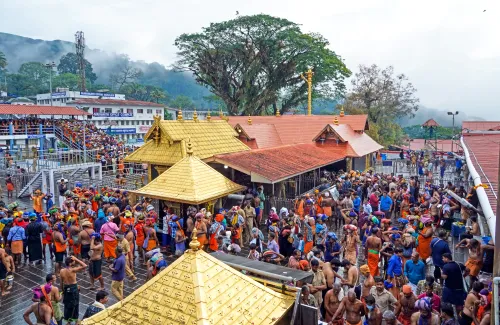What is the New High-Yield Ginger Variety 'SAS-KEVU' Developed by Nagaland University?

Synopsis
Key Takeaways
- 'SAS-KEVU' offers a yield potential of 17.21 tonnes per hectare.
- It is approved for cultivation in Nagaland, Mizoram, West Bengal, and Andhra Pradesh.
- The variety is designed to increase farmer incomes significantly.
- 'SAS-KEVU' has enhanced culinary attributes.
- It represents a commitment to agricultural innovation and sustainability.
Kohima, Nov 18 (NationPress) A dedicated research team from Nagaland University, the sole Central university in the region, has successfully created a high-yield ginger variety known as 'SAS-KEVU'. This innovative variety aims to significantly boost farmer earnings and strengthen India’s ginger value chain, as reported by officials on Tuesday.
Officials highlighted that this new ginger variety consistently produces superior yields, improved dry-matter recovery, and enhanced culinary attributes, establishing it as a valuable crop for farmers, the fresh produce market, and the spice-processing sector.
Developed under the All India Coordinated Research Project (AICRP) on Spices at Nagaland University, SAS-KEVU was the result of nearly a decade of scientific scrutiny and extensive multi-location testing across seven AICRP centers throughout India.
The research initiative was spearheaded by Prof. C. S. Maiti and Dr. Graceli I. Yepthomi from the School of Agricultural Sciences at Nagaland University.
The SAS-KEVU variety was officially recognized by the sub-committee on Crop Standards, Notification and Release of Varieties (Horticultural Crops), under the Ministry of Agriculture and Farmers Welfare, on September 2.
With a yield potential of 17.21 tonnes per hectare, SAS-KEVU exceeded the national check variety by over nine percent in national demonstrations. Its dry recovery rate of 21.95 percent provides a significant advantage for processors seeking higher output during the drying process.
The rhizomes are characterized by a soft texture, substantial size, and lemon-yellow flesh with much lower fiber, making them appealing to consumers and suitable for pickles, beverages, culinary applications, and value-added products.
Expressing his congratulations to the research team, Prof. Jagadish K Patnaik, Vice Chancellor of Nagaland University, stated: “We are immensely proud to announce the development and national notification of a new high-yield ginger variety - 'SAS-KEVU'. This significant achievement is the culmination of nine years of intensive, coordinated national trials conducted by our committed team of scientists in partnership with various institutions.”
He further emphasized that 'SAS-KEVU' has been specifically developed to provide higher yields, enhanced quality, and greater resilience, offering farmers a dependable variety that can markedly improve their incomes.
Prof. Patnaik added that the introduction of this variety is expected to fortify India’s ginger value chain, encourage regional agricultural innovation, and contribute to the broader national vision for sustainable and profitable horticulture.
Nagaland University is steadfast in its commitment to scientific excellence, farmer welfare, and the advancement of agricultural research in the North-East and beyond, he affirmed. The food processing industry will also benefit from SAS-KEVU’s moderate oil content and pulpy, robust rhizomes, which are well-suited for candy and ginger paste production.
For farmers, the combination of high yield, favorable market acceptance, and desirable rhizome characteristics translates into enhanced returns per hectare. The crop matures in just nine months, seamlessly fitting into the production cycles of regions where ginger is traditionally grown.
Reflecting on the project’s journey, Prof. C. S. Maiti from the Department of Horticulture noted: “The journey for this variety began in 2014, when nineteen clones of the local Nadia ginger were collected from growing areas in Nagaland and meticulously studied for their morphological and biochemical traits. From these, the clone NDG-11, later named SAS-KEVU, was identified as the standout performer. From 2018 to 2022, it underwent evaluation in national coordinated trials in Chintapalle (AP), Kozhikode (Kerala), Mizoram, Nagaland, Potangi (Odisha), Pundibari (WB), and Sikkim. Stability analyses, including GGE Biplot evaluations, confirmed SAS-KEVU's remarkable performance across diverse agro-climatic zones, especially in Nagaland, Pundibari in West Bengal, and Chintapalle in Andhra Pradesh.”
Dr. Graceli I. Yepthomi, Assistant Professor, added, “With the Central Government’s notification under the Seeds Act, 1966, SAS-KEVU is now sanctioned for seed production and agricultural distribution in Nagaland, Mizoram, West Bengal, and Andhra Pradesh.”
This landmark achievement not only validates the scientific rigor behind the variety but also solidifies Nagaland University’s leadership in agricultural innovation and spice crop research, he added.
This variety represents the first crop variety developed by the AICRP (Spices) team from Nagaland University, marking it as the first ginger variety from a research institute in the Northeastern states of India.
The creation of SAS-KEVU highlights the university’s dedication to leveraging local genetic resources for the benefit of the nation.
Nagaland University anticipates that SAS-KEVU will significantly advance ginger cultivation across the Northeast and other notified regions, fostering both economic progress and agricultural resilience.









